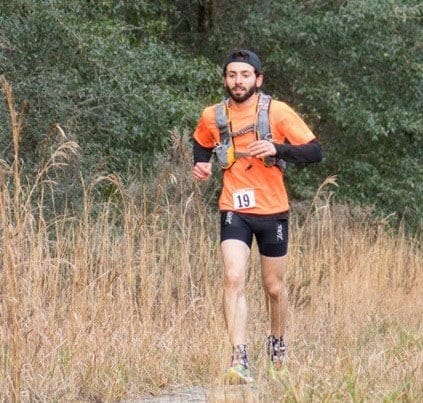He always dreamed of crossing America by foot, but when he did he wanted it to be for a reason bigger than himself.
Dr. Levi Rizk has found one.
Rizk, an ultra marathoner and a family doctor in rural Hot Springs, Va., has put his life on hold for an epic-cross country journey, with his six-month pregnant wife and 2-year-old daughter in tow.
Starting in Los Angeles on Sept. 11, Rizk plans to run no less than 30 miles every day, ending in Washington about 100 days later. His wife will shadow him in a donated RV camper that, when he’s finished, will be converted into a mobile health clinic to be used in low-income neighborhoods.
Rizk, 33, started running 12 years ago, when he was still an undergraduate college student. He took it up the way many people casually do, to decompress, to stay in shape. But running had an almost transcendental impact on him. He kept pushing himself to greater distances, until going out for an afternoon marathon-length run was part of his routine.
When Rizk sat down with his wife, Mandy, in a house in France for a Skype interview Monday morning, he had just completed a 103-mile race through the Alps, the Ultra-Trail du Mont-Blanc that crosses France, Italy and Switzerland. It took him about 39 hours. Five days earlier he’d done a 175-mile run in 58 hours through Portugal. These were his training runs for his transcontinental venture. He will fly to D.C. on Wednesday and then on to L.A., where he will rest for a few days before setting off from the Santa Monica Pier on a 3,000-mile run.
Yes, his wife could go into labor before he finishes. And they both had to take leave from work for more than four months. They thought about canceling when they found out she was pregnant, but they agreed there would never be an ideal time. Opportunities like these, to fulfill both his personal and professional goals in such a profound way, must be seized.
Several years ago, “he told me that he had a dream that someday he would run across America for something he was passionate about,” Mandy Rizk said. “Something that moved him to do something like that for.”
“I believe deep down that every single one of us is given a gift of some sort,” the doctor said, “and there is a way to use that more than just to satisfy our own needs and wishes.”
It was over dinner when the idea was hatched. Rizk was chatting with his friend, Steve Messeh, who several years earlier had left his job in finance to run a nonprofit, the Hope Association, which provides services for low-income children in the Washington, D.C. area. Messeh mentioned that a recently widowed man in California had offered to donate his 40-foot RV to the organization. At first he didn’t know what he would do with it, but in conversations with local community partners he learned that one major issue for low-income families is access to medical care, and one solution is bringing doctors to them.
Rizk lit up. He’d always dreamed of running across the country, but needed an RV to do it. And as a family doctor in a rural area he knew firsthand the health-care challenges for poorer Americans who might not have transportation to or the money for a doctor’s visit.
So they agreed that the Hope Association would build an entire campaign around Rizk’s run. The organization is building an app so people can follow Rizk’s journey. When the Rizks pass through nine major cities on their route, there will be events there to welcome them and raise awareness. When he reaches D.C. in mid-December, there will be a party on the National Mall to greet him.
Their goal is to raise $250,000 to retrofit the RV as a health clinic with all the equipment and appearance of a regular doctor’s office. So far they’ve raised $132,458.
Currently in Washington, there are several mobile health clinics already in operation. But the need is still great to reach the communities where visiting a fixed health-care site is a struggle, especially for children, for whom its imperative to develop healthy habits early.
A 2009 study out of Harvard Medical School estimated the return on investment on a mobile health clinic is approximately $30 to every $1 spent because it lessens costly trips to the emergency room and provides preventive care.
The Hope Association imagines its mobile clinic being geared toward pediatric care, but would provide treatments to the adults who bring the children. They hope to take the RV to schools and community centers, and return with enough regularity that the patients will form trusting relationships with the doctors and nurses.
For Rizk, being a doctor is about those bonds, especially with children. Practicing medicine has also made him a better runner, he said. His job is a daily reminder that the human body can be weak and that no one is invincible. Seeing that makes him want to continue pushing his body to be stronger, to do more.
That includes running more than a marathon every single day for more than three months so that D.C. can have another mobile health clinic.
“Often as human beings when we look at something that doesn’t seem comfortable we want to stay away from it,” Rizk said. “We hardly ever choose the uncomfortable route, but the thing I learned the most from running is that the uncomfortable stuff is the stuff that really pays off. It’s the hard races that have been the most memorable to me. It’s not the easy races. The more difficult the path, the more significant the outcome.”






